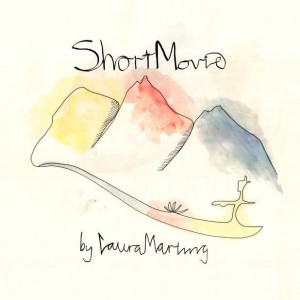You wonder if Laura Marling has ever stood still. From the moment she released her first EP at the somewhat impatient age of 17 everything she has done has been a progression, a departure, a new set of ideas. With each album, she has sought a new sound, working with different line-ups to pursue something fresh. Perfect one thing, then move on.
But somehow she was always in a comfort zone. Things can come easily for the daughter of a baronet, and Marling had to keep pushing herself harder and harder. For her fifth album, Short Movie, Marling has gone further than ever before – literally. Feeling burned out after touring Once I Was An Eagle into the ground, she followed her heart and her boyfriend to Los Angeles. The relationship did not last, but her visa did and, freed from everything she had ever known, Marling began her own sort of gap year.
She learned how it felt to be lost and adrift while in the centre of a huge city, how to deal with rejection (aside from the break-up of her relationship, she applied anonymously for a college poetry course, and was turned down), how it felt to be truly alone. Taking to the road to play small-town gigs where no one knew her name, she also reconnected with the music she had almost come to take for granted.
In short, she grew up. Marling’s music has never lacked maturity, but only a few notes into Short Movie, and you can hear how much she has grown in the last 18 months. There’s a new edge, most obviously expressed in the electric guitar which rips through ‘False Hope’ and ‘Don’t Let Me Bring You Down’ but also in lyrics which, while not completely breaking down the wall Marling has so carefully built, seem more personal than ever before.
The record begins with ‘The Warrior’ building tension like a wave that won’t break, cuing up the unsettled mood which permeates the album, but it is in ‘False Hope’ that Marling opens up. ‘Is it okay that I still don’t know how to be alone?’ she asks, while a gloriously defiant guitar riff seems to answer the question for her. She explores love and loss on ‘Walk Alone’ and ‘Strange’ with a directness we’ve not heard before, perhaps older and wiser but also more confident and comfortable in her own skin.
Before Christmas, Marling put an end to her American wanderings and moved back to London. Her time away had, at times, been deeply frustrating and chastening, but she did not come home in defeat. When you listen to music as free and liberated as ‘Gurdjieff’s Daughter’ you can hear that Marling has come back stronger, as though she has passed some sort of test she set herself. “I’m taking more risks now/I’m stepping out of line/I put up my fists now until I get what’s mine” she sings on ‘How Can I’.
There has always been a frenetic element to the way Marling has constantly reinvented herself, but Short Movie is the fullest realisation of that mood yet – stripping away her own comfort zone to truly challenge herself (“When you’re winning, you’re already losing” – from ‘Divine’). The frustration and loneliness Marling felt is expressed in the most forceful, at times outright aggressive, album she has produced to date.
This won’t be everyone’s favourite Laura Marling album (given the harsher edge it might take many fans time to get their ears around it) but it seems to most neatly explain her own story – that of a restless spirit who keeps pushing herself in new directions, even if the results might not always be comfortable. It’s what makes her the most interesting, most vital artist in her field.

